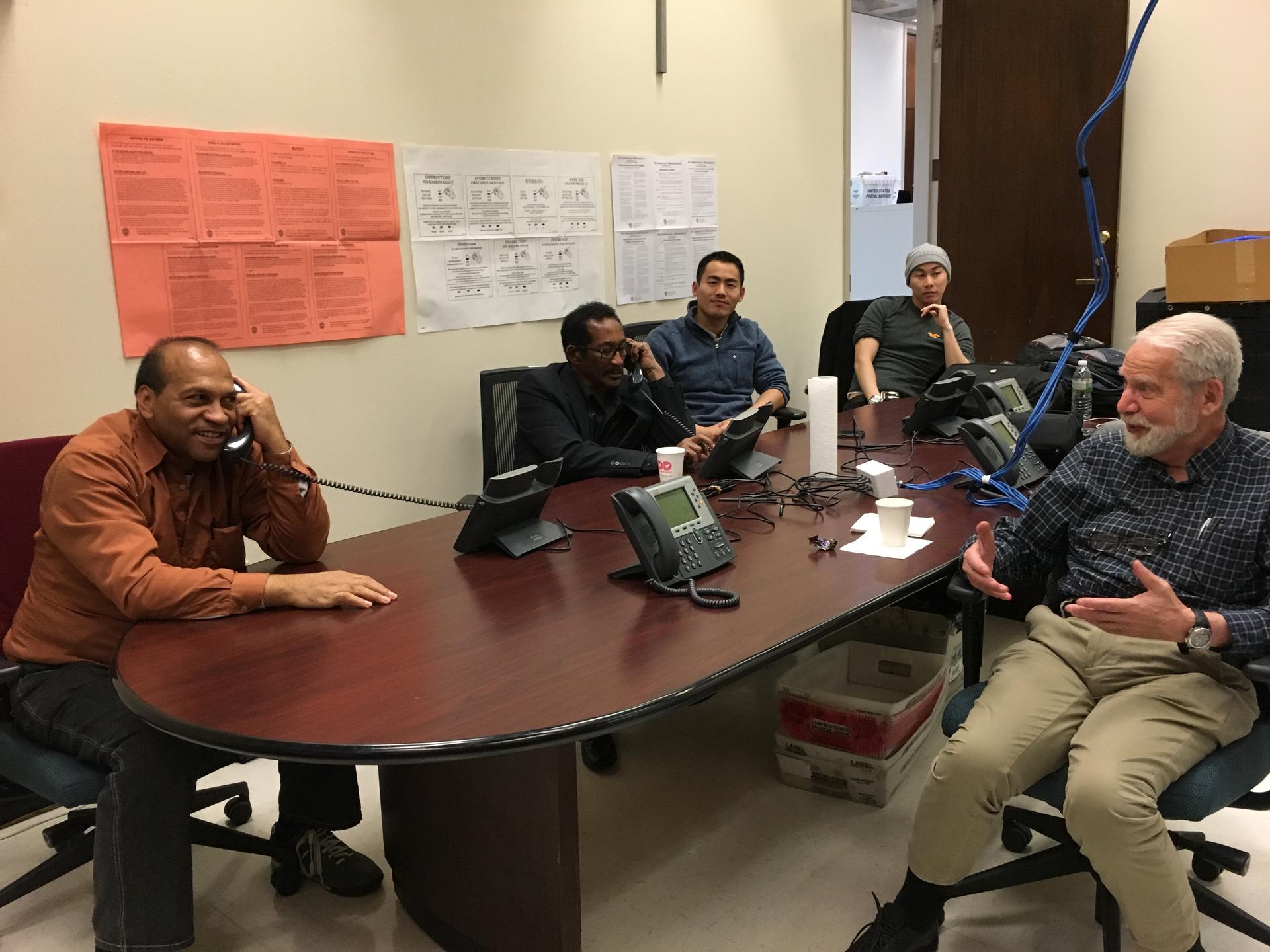How Boston helps its non-English-speaking voters fill out their ballots
Boston's ballot interpreters work the phones at City Hall.
With so many new citizens voting for the first time this election, interpreters will likely be in high demand at the polls. Federal law requires ballots be printed in multiple languages in areas with a high concentration of voters who are not proficient in English.
In Boston, the city has a program to meet that requirement (and more): When a US citizen who isn’t fluent in English wants to vote, an interpreter helps them — translating the ballot and explaining the process. Unlike other poll workers, "ballot interpreters" don’t have to be US citizens. All they need is the desire to help with the democratic process.
For 13 years, Lynne Onishuk has helped coordinate Boston’s elections from her office deep inside City Hall. On her desk is a packet of yellow paper. It’s the master guide for Boston’s ballot interpreters, she says, as she flips through the pages.
“It’s very wrinkled and very well-used,” she says.
It's unclear exactly when the position of ballot interpreter was created. But sometime between 20 and 30 years ago, Boston’s Election Department realized it had a problem.
Under the federal Voting Rights Act, Boston’s ballots had to be printed in English and Spanish, but some voters were demanding more: Spanish speakers had questions they wanted to ask. And citizens who spoke a language other than English or Spanish also wanted to vote.
The solution is in that wrinkled stack of yellow paper. It has two columns. One lists all 255 precincts in the city. In the other, someone has handwritten which precincts need which language translators.
“Russian in Allston-Brighton, Creole in Hyde Park, Dorchester is Vietnamese,” Onishuk says. “You are good to go with Spanish everywhere, wherever someone can help.”
The goal is for interpreters to work at polling places. But since the Election Department is always looking for more interpreters, the city has developed another system. It takes the form of a windowless conference room and a lot of phone lines.
It’s a call center that’s set up in City Hall, just a room over from Onishuk’s office. On Election Day, there will be more than a dozen translators. During early voting, there are just a handful of people staffing it. They come from all around the globe — China, Vietnam, Cape Verde and Haiti.
The youngest interpreter is 30. The oldest, who is 83, says he’s been coming to work at the call center for quite a long time.
"I don’t remember exactly, but it can be about 18 years," says Oleg Volya.
Volya came to the US from Moscow, where he was an engineering professor. Like everyone else in the room, he’s an immigrant and remembers how hard it was to move here.
"Everything was strange for me … amazing but strange," he says.
Voting was particularly amazing and strange. He says it’s a world apart from what happens in Russia.
Vinny Huynh, who is sitting next to Volya, says he had a similar experience. He’s originally from Vietnam, where he says there’s “no freedom at all.” And his favorite thing about America’s political system is its freedom.
While the interpreters are paid — $9 an hour — many say that’s not why they’re here. Instead, they talk about feeling a sense of pride in helping the country’s democracy.
However, the work can be frustrating.
Across the table from Volya and Huynh, Emmanuel St. Pierre answers a call for a voter who needs a French Creole translation.
St. Pierre, who’s wearing a spiffy suit for the day’s work, listens intently. But, after a few moments, he begins to shake his head.
"She wants me to tell her who to vote [for]. I cannot do that,” St. Pierre says.
He has noticed that people generally arrive at polling stations knowing who they're going to vote for in one race — say, Clinton versus Trump — but when it comes to the rest of the ballot, they often ask the interpreters which way to vote.
In this room, everyone is adamant that they can’t answer that question.
And Volya says they also face one other challenge.
"Sometimes some languages I don’t know,” he says. “For example, I still don’t know — what does it mean, 'Tagalog?' Where is it?”
Tagalog is spoken in the Philippines.
When the interpreters get a call about a language that's not represented in the room, they ask other departments in City Hall to see if there’s anyone who can help.
And if they can’t find someone, their only option is to apologize. In English.
This story is originally from WGBH, Boston's local NPR and our partner station.
Every day, reporters and producers at The World are hard at work bringing you human-centered news from across the globe. But we can’t do it without you. We need your support to ensure we can continue this work for another year.
Make a gift today, and you’ll help us unlock a matching gift of $67,000!
